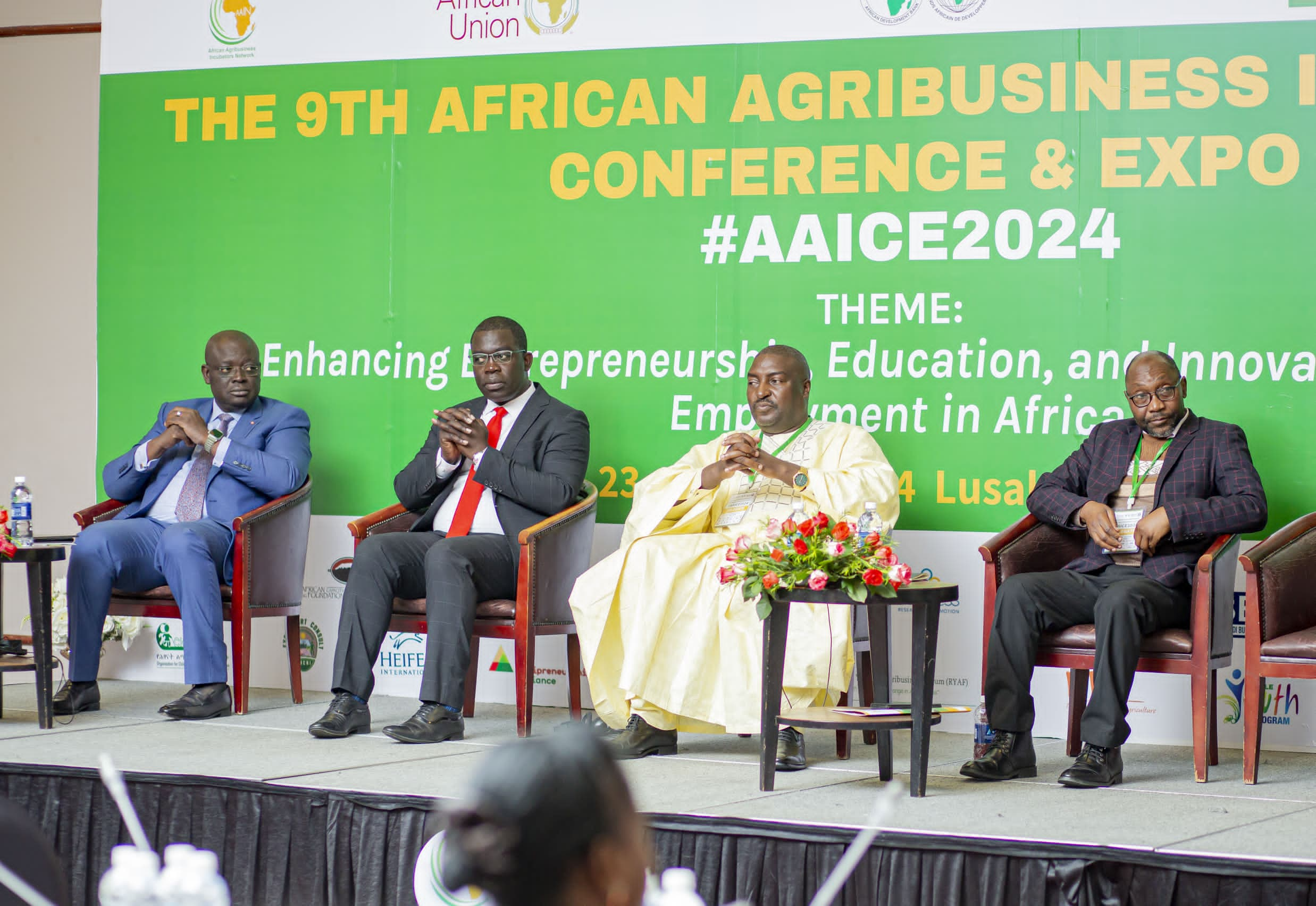|
Getting your Trinity Audio player ready...
|
There is a need to develop the capacity to innovate, recognize, and create opportunities by encouraging African universities to transition from the first and second university missions of teaching and doing basic/fundamental research to the third mission of contributing to economic development by applying research findings in business practices in pursuit of creating employment opportunities in agribusiness.
These were the sentiments of the African Agribusiness Incubators Network (AAIN) Board Chairperson, Prof. Henry M. Bwisa during the 9th African Agribusiness Incubation Conference and Expo (AAICE) 2024 held under the theme: “Enhancing Entrepreneurship, Education, and Innovative Skills for Employment in Africa” held from the 23rd to 26th of July 2024 in Lusaka, Zambia.
The Conference was hosted by Musika Development Initiatives of Zambia and supported by the African Union Commission (AUC), the African Development Bank (AfDB), the membership (Incubators, Accelerators and Entrepreneurial Support Organisations – ESOs) of the Network, and a consortium of national, regional and international partners.
“The needs of the 21st century have ushered in the third mission of the University which is to generate, use, apply, and exploit knowledge with external stakeholders and society in general. The university can no longer be an ivory tower that churns out scholars only. Every university must today be entrepreneurial i.e., develop the capacity to innovate, recognize, and create opportunities. This is why the conference theme is relevant and among invitees are academicians.
“Dear participants, according to the African Development Bank Group, of Africa’s nearly 420 million youth aged 15-35 (Generation Z), one-third are unemployed and discouraged, another third is vulnerably employed, and only one in six is in wage employment. This is where the theme of this conference squarely comes in. African universities need to transition from the first and second university missions of teaching and doing basic/fundamental research to the third mission of contributing to economic development by applying research findings in business practices,” Prof Bwisa said.
The African Development Bank group laments that there is an untapped agricultural potential that has contributed to persistent poverty and deteriorating food security, with the Bank projecting an increase in the number of undernourished people on the continent from ~240m in 2015 to ~320m by 2025.
The said situation calls for the enhancement of entrepreneurship, education, and innovative skills to create not just employment for the youth but also reduce poverty and enhance food security.
In his address, Prof Alex Ariho, the Chief Executive Officer of the African Agribusiness Incubators Network said the conference had the objective of providing a platform for promoting Entrepreneurship Education and Skills for decent and fulfilling Employment in Africa, advancing the Agribusiness Incubation agenda in Africa within the broad context of the Africa Continental Agribusiness Strategy (CAS), 2017 and the African Agribusiness Youth Strategy (AAYS), 2022, and advancing the African entrepreneurial spirit through agribusiness investment support for Youth and Women in realization of the Sustainable Development Goals (SDGs).
“With a particular focus on agribusiness investment support for youth and women, our efforts contribute directly to the realization of the African Union Agenda 2063 and the UN SDGs. Since Africa is the youngest and fastest-growing continent in the world, agribusiness has the potential to create and scale up decent employment opportunities for young women and men, and the growing challenge of youth employment for which African governments have to re-engage in sound rural development powered by the engine of agricultural growth and agrifood systems resilience.
“Agribusiness incubators and accelerators are already playing an important role in supporting enterprise development and growth-oriented businesses in Africa. We recognised that agribusiness incubation and acceleration is still a relatively recent development in Africa and hence there is very limited knowledge among policymakers and practitioners alike on the establishment, sustainable operation, and impact of these incubators. We also recognised the positive changes within the African agri-food eco-system over the last few years, particularly the very encouraging and much-needed growth and diversity within the eco-system bringing more African-led and African-based Entrepreneur Support Organisations to become active in countries across the continent; and the need to rethink how agribusiness incubators operate and how they can provide effective support through information and communication technologies (ICTs) and digitalization,” Prof Ariho said.
He said there is a need for African governments to strategically position MSMEs, business incubators, accelerators, and enterprise support organizations as pathways for job, employment, and wealth creation at the center of the emerging opportunities in Africa and the growth agenda within the context of the African Continental Free Trade Area (AfCFTA).
He also underscored the need to inspire and motivate youth and women to venture into agribusiness start-ups, SMEs, and ESOs. This should be coupled with promoting scalable and sustainable youth and women-led entrepreneurship and economic initiatives; fostering business research, technology commercialization, skilling, and capacity development for effective economic transformation through agri-food systems in Africa; and mobilizing investors and development partners to support business incubation and acceleration for trade and investment in Africa.






